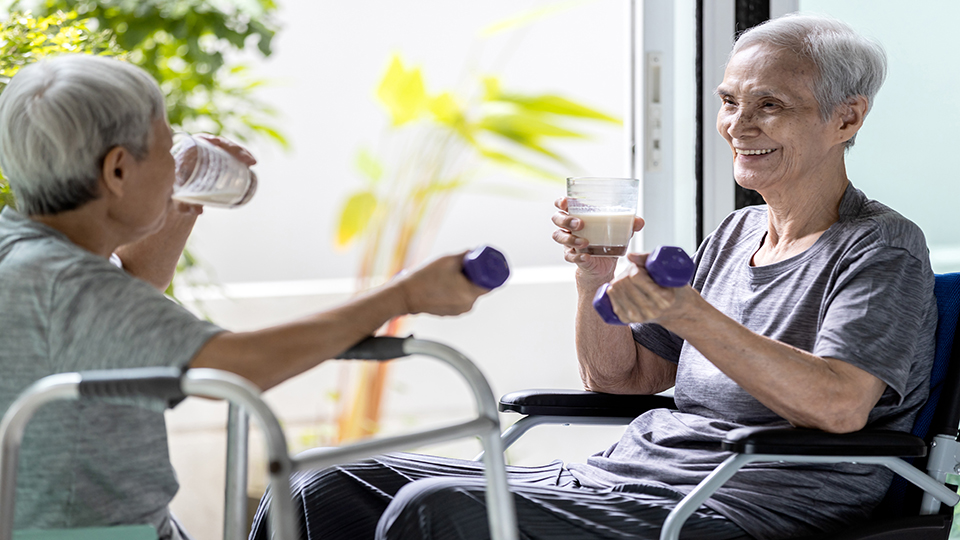Good mental health and positive life outlook play an important role in longevity: SG90 Study
Published: 21 Feb 2023

Disabled old elderly people in a wheelchair drinking beverages,dietary supplements,healthy senior woman holding glass of fresh milk, exercising in the morning with her friend for health in nursing home
Copyright: chai89>
A study by Yong Loo Lin School of Medicine (NUS Medicine) and Faculty of Arts and Social Sciences, National University of Singapore researchers of 1,000 Chinese Singaporeans between 85 years old and 99 years old has found that good mental health, a positive outlook and life satisfaction, despite poor physical health, can have beneficial effect in enhancing longevity beyond 85 years old.
The SG90 study is part of the Singapore Chinese Health Study, one of the largest Asian-based population cohort studies done by NUS Medicine, led by Principal Investigator Prof Koh Woon Puay.
In Singapore, and worldwide, older adults who live past 85 years old, often referred to as the oldest old, are increasing in numbers. While living beyond 85 may be a measure of successful ageing in terms of years of life, what are the factors that may account for longevity among the oldest-old?
In this study led by Professor Koh Woon Puay from the Healthy Longevity Translational Research Programme at the Yong Loo Lin School of Medicine, National University of Singapore and Assoc Prof Feng Qiushi from NUS Faculty of Arts and Social Sciences, the cohort participants were examined for 12 objective and subjective markers that are commonly used to define successful ageing in gerontology.
The six objective markers included the absence of chronic diseases, independence in function and activities of daily living, intact cognition, and engagement in social and productive activities. These are considered objective markers as they are measured using established questionnaire instruments.
The six subjective markers, on the other hand, are self-perceived counterparts of the aforementioned objective markers, and included self-rated health, feelings of well-being and satisfaction about one’s subjective memory, cognition and ability to cope with activities of daily living, as well as happiness with relationships and life.
Four distinct groups emerged from the data based on the combination of objective and subjective markers. The two contrasting groups were the frail and dejected group, which scored low in both objective and subjective markers, and the fit and positive group, which scored high in both objective and subjective markers. A third group scored a close second to the fit and positive group in objective markers but scored much lower in subjective markers, and this group was referred to as the fairly fit and neutral. Interestingly, there was a last group that scored as low as the frail and dejected group in objective markers but scored almost as high as the fit and positive group in the subjective markers and also in social engagement. This last group was referred to as the frail but resilient group.
Other than the frail and dejected group, the other three groups were more likely to perceive themselves to have adequate financial resources, and to be engaged in weekly exercise. The fairly fit and neutral group and the fit and positive group were also more likely to be staying alone and reported to have stronger social networks, compared to the frail and dejected, and frail and resilient groups.
The researchers followed these four groups over an average of three years and tracked their survival. Predictably, the fit and positive groups scored the highest probability of survival while the frail and dejected group had the lowest. The fairly fit and neutral group had a probability of survival between these two groups.
Remarkably, the frail but resilient group, had a similar probability of survival as the fairly fit and neutral group, despite these participants registering much lower scores in objective markers. Compared to the frail and dejected group, the frail but resilient group recorded a 37% reduction in mortality risk, suggesting that their much higher scores in subjective markers and social engagement (which implied better emotional, psychological and social health), were able to improve their survival despite being equally frail.
This study confirms that age-related perceptions, feelings, and well-being are shaped not only by objective measures but also by psychological processes. For instance, through social comparison, an elderly who is dependent in his activities of daily living may still report /have a high level of satisfaction upon noticing that a friend’s functional status is poorer. Additionally, such an elderly may choose to compensate for health and functional deficits and achieve daily activities with assistive devices or the help of others and, in turn, still be satisfied with life. Therefore, such an elderly may still have positive subjective appraisals despite failing in objective criteria.
This paper was published in Gerontology.
Click here for the press release.
News Coverage

